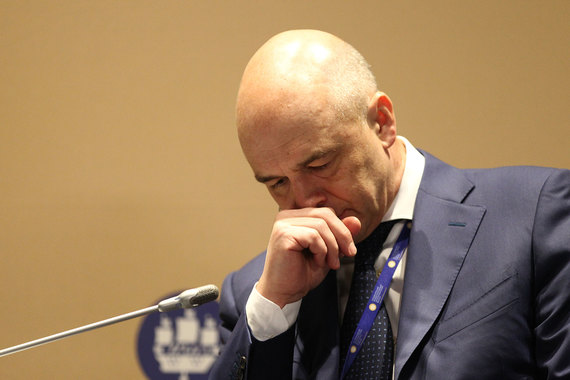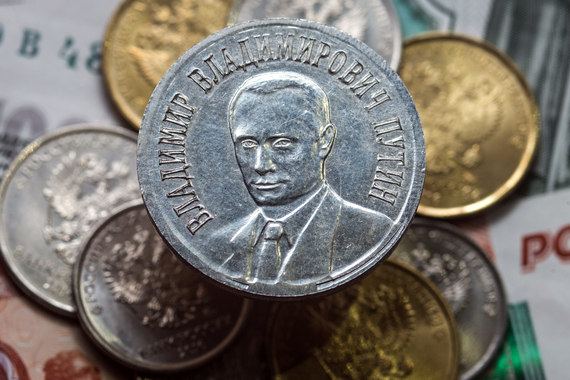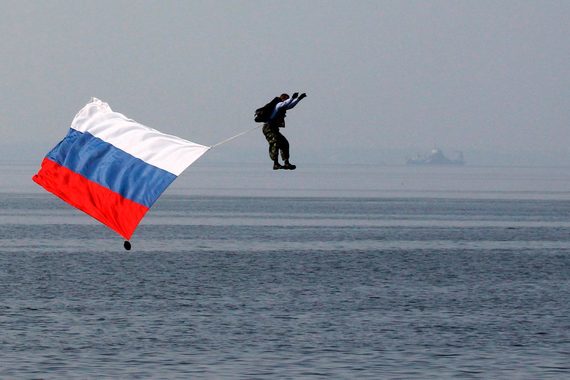The economy is falling off a cliff
For the draft budget 2017-19, Russian government revenues in relation to GDP will continue to fall during the next three years, reaching a 20-year low in 2019 (13.3% of GDP).

A study of the draft budget shows that oil and gas revenues will continue to decline both in nominal terms and in relation to GDP.
Over the last ten years, the proportion of revenue re-distributed through the federal budget has been on average 20% of GDP. Over the next three years declining oil and gas revenues will see it fall to 13.7% of GDP. In 2006 they contributed more than 10% of GDP income to the budget, but in 2016 that figure will be less than 6%, and in the next three years less than 5%.
These conclusions are derived from the baseline scenario of the Economic Development Ministry’s updated forecast, in which the oil price remains at $40 per barrel for the next three years. Aleksei Ulyukayev, Economic Development minister, announced that this is the figure on which the government will base its 2017-19 budget. Presidential assistant, Andrei Belousov, considers that this is reasonable; and deputy prime minister Arkady Dvorkovich said that the approach to planning the 2017 budget should be conservative, so it will be based on an oil price of $40.
The Finance Ministry’s calculations show that budget revenues for this year will be 1.2 trillion roubles less than allowed for in the budget law
The Finance Ministry’s calculations show that budget revenues for this year will be 1.2 trillion roubles less than allowed for in the budget law, which was based on a barrel price of $50. The new estimate is $41 per barrel. There will be an 8% fall in 2016 revenues by comparison with 2015, and, taking account of average annual inflation (estimated by the Finance Ministry at 7.1%), the fall in real terms will be over 15%. The Finance Ministry forecast is that revenues will only start to increase in 2018, but by less than the average annual inflation. As a result, in real terms they are shrinking by almost 25% (23.6%), in comparison with 2015 levels.

Government expenditure for the same period will fall in real terms by almost 20% – on condition that its level (15.78 trillion roubles per year) is frozen for three years, as presumed by the government, and that expenditure for 2016 will also be reduced to this level. Without this reduction, the deficit for 2016 will exceed 4% of GDP, whereas the Finance Ministry is determined to keep it to 3.3%. But even if nominal expenditure is frozen for the next three-year period, it will be necessary either to reduce them by 3.5 trillion roubles, or to increase revenues by the same amount. Otherwise the Finance Ministry’s planned gradual deficit reduction will not be possible. The ways of increasing taxation from 2018 devised by the Finance Ministry have as yet not been accepted by the cabinet of ministers.
Budget reserve
Conservative planning in effect makes possible an increase in revenues. Minister Ulyukayev considers it highly unlikely that the oil price will remain at its current $41-42 level over the next three years: a more realistic forecast would be $50 in 2017 and $55 in 2018-19. This estimate is based on a consensus forecast made by energy and finance analysts, said the minister, and has formed the basis for another ministry forecast – “base plus.” Federal officials had previously told Vedomosti that the Economic Development ministry had been minded to propose this as the basis for the budget, so as to avoid an even more drastic consolidation.
According to Finance Ministry calculations, every $1 increase above the current price of $40 will bring upwards of an additional 87 billion roubles into the budget
According to Finance Ministry calculations, every $1 increase above the current price of $40 will bring upwards of an additional 87 billion roubles into the budget; if at the same time the rouble should strengthen, then this figure rises to 144 billion roubles (as long as the exchange rate remains stable). The required scale of consolidation in 2017 will be 710 billion roubles (of 3.5 trillion over three years), thus an “extra” $10 per barrel in 2017 could completely solve the problem. The idea was to factor in a higher oil price and another exchange rate, but for the moment this has not been done. As the federal official said, “We agreed that the price for the three year period in the budget would be $40.”

Revenues for 2016 have been adjusted because of the change in the oil price and the exchange rate. However, if financing is reduced by 10%, a deficit of slightly more than 3.2% would be a possibility, says the official. Ulyukayev said that the planned reduction of limits in 2016 has led to a deterioration in the projected economic contraction from minus 0.25 to minus 0.5-0.6%: “This is the notorious budget consolidation effect.” In the spring, forecasting a 0.2% decline in end-of-year results, the Economic Development ministry proposed that the already announced reduced budgetary financing would still be reintroduced, but now the chances of needing this were almost zero. Ulyukayev said “We took this into consideration as a possible means of meeting the shortfall in both demand and in investments.”
“Recession and stagnation do not stem from budget policy”
Even freezing nominal expenditure could cost the economy half a percentage point in the annual growth rate, according to Natalya Akindinova, director of the Higher School of Economics Centre of Development. But budget planning is best done conservatively; any additional revenue can be allocated to speeding up the deficit reduction: “The problem of the long-term lack of balance in the budget has to be addressed. Recession and stagnation do not stem from budget policy, although a real reduction in expenditure can have a negative effect on the economy … To accelerate growth it’s not increased expenditure that is needed, but a change in structure – replacing unproductive expenditure with productive – and reforms.” With such poor returns, at a level of 13% of GDP, the budget will not be able to finance the expenditure needed for the state to be able to carry out its functions, she concludes, and an increase in taxation becomes inevitable.
What has to happen is that first, administration of the existing rules should be maximally improved, and only then consider what to do next. The Finance Ministry estimates that better management could bring in an extra 50-70 billion roubles a year – less than 5% of the required consolidation (3.5 trillion roubles). Yevgeny Gurvich, head of a group of specialist economists, thinks there is a choice: either increase revenues, or cut back on expenditure. Cuts are the lesser of two evils, and there are considerable reserves for this.
This article was first published in Vedomosti



